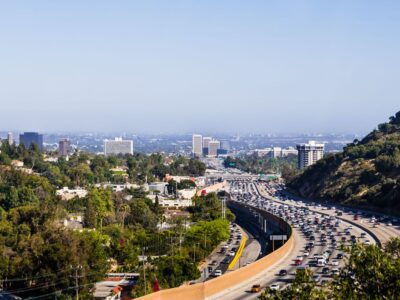San Diego Loses Appeal On Its Weak Transportation Plan
Today ‘s ruling confirms that the plan failed under CEQA to consider greenhouse gas emissions to 2050
Back in 2011, the San Diego Association of Governments issued a really bad regional transportation plan. These plans must prioritize transportation investments across the metropolitan region for the coming decades and are the basis for receiving state and federal infrastructure dollars. And while most regional transportation plans are usually pretty bad (i.e. favoring highway expansion over core maintenance and transit/biking/walking infrastructure), SANDAG’s happened to be the first in the state to have to comply with SB 375, a law linking transportation investments with land use policies to reduce greenhouse gas emissions. So it held even more significance.
Environmental groups, along with the California Attorney General’s Office, sued SANDAG under the California Environmental Quality Act (CEQA), alleging that SANDAG inadequately considered the plan’s effects on greenhouse gas emissions by 2050. They argued that the agency should have taken those impacts into account given a 2005 executive order to reduce emissions by that year.
They had a strong case. To comply with SB 375, SANDAG essentially fudged the short-term numbers, relying on highway expansion and more telecommuting to reduce greenhouse gases through 2035. But by 2050, the plan actually showed increasing greenhouse gas emissions, out to a time when we need to be reducing emissions significantly. As a result, SANDAG lost in the trial court.
And today they lost the appeal. Judge McConnell of the Fourth Appellate District wrote the decision affirming [PDF] the trial court decision (perhaps influenced in part by CLEE’s amicus brief), sending the matter back to the trial court for SANDAG to beef up its analysis of the 2050 goals and the range of options the agency has available to comply:
As evidence in the record indicates the transportation plan would actually be inconsistent with state climate policy over the long term, the omission deprived the public and decision makers of relevant information about the transportation plan’s environmental consequences. The omission was prejudicial because it precluded informed decisionmaking and public participation.
Judge Benke wrote a fiery dissent, calling the court’s decision “breathtaking” in its judicial overstepping into local planning matters. But the reality is that SANDAG needs to own up to the backsliding in emissions by 2050 and provide the public with a reasonable range of options to avoid this outcome. It fundamentally failed to do so in the first round. Even if some of those options might seem politically difficult (like asking rural or exurban areas to take a backseat on highway expansion in favor of investing in the populated core areas), SANDAG should lay it out there for people to understand.
Regardless, SANDAG’s next transportation plan (already well underway) should be a vast improvement. In fairness to the agency, the staff did not have much time to incorporate SB 375 goals into the original plan, which was already being written at the time SB 375 passed. But the agency has now had four years to do so for the next plan. So SANDAG has no excuse to avoid improving the CEQA document on the old plan and coming up with a decent new plan.
Perhaps more importantly, the case has served an important political role in letting other regions know that they need to do a solid job complying with SB 375 going forward. Nothing wakes an agency up like a lawsuit, and advocates have been able to leverage the threat of a similar lawsuit to encourage meaningful changes in transportation plans across the state since SANDAG’s plan. So in that sense, the case was already a victory for advocates even before today’s ruling.





Reader Comments